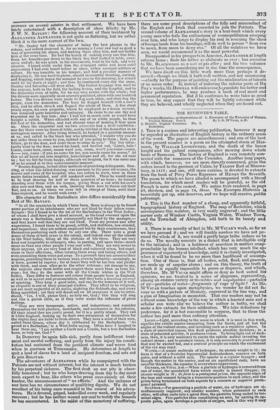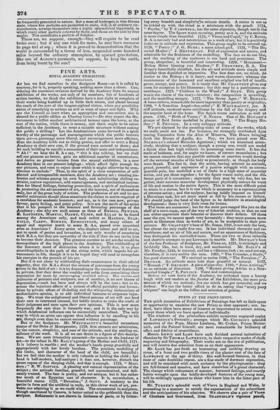THE REVIEWER'S TABLE.
I. Excerptallistorica ; or Illustrations of 3. Elements of the Economy of Nature.
English History. Part I. By I. G. WVicar, A.M. 2. Houle's English Counties. No. I. Berkshire.
1. THIS is a curious and interesting; publication, however it may be regarded as illustrative of English history in the ordinary sense of the word. The papers are miscellaneous ; and one of the best in the present number is a poem on the attempted storm of Massoura, by WILLIAM LONGSWORD, and the death of the brave knight and his gallant companions, after mowing down whole hosts of Saracens. The history of England is very remotely connected with the romances of the Crusades. Another long paper, with which, however, we are more directly concerned, gives the orders issued to the garrison of Calais, by TALBOT Earl of Shrewsbury, in 1419; and one, still more curious, is devoted to extracts from the book of Privy Purse Expenses of HENRY the Seventh. The poem to which we have alluded is accompanied with a literal translation, for which most readers will be grateful, as the old French is none of the easiest. We notice treis rendered, in page 69, thirteen, and in page 74, three. The Excerpta Historica is beautifully got up, and deserves, and we hope will receive, public patronage.
2. This is the first number of a cheap, and apparently faithful; topographical history of England. The map of Berkshire, which i accompanies this number, s very neatly engraved ; and the little corner cuts of Windsor Castle, Virginia Water, Windsor Town, and the Town-hall of Abingdon, add both to its beauty and. utility.
3. There is no novelty of fact in Mr. M‘VicAR's work, so far as we have perused it; and we will frankly confess we have not perused the whole of it, nor would a pretty large bribe induce us to do so. The novelty consists in a dialect that is intelligible only to the initiated ; and in a boldness of assertion in matters unapproachable by the human intellect, which has very much the appearance of superiority of knowledge, until it is closely investigated, when it will be found to be no more than hardihood of assumption. One of these is, that all bodies, solid, fluid, and gaseous, are made up of angular atoms; • and on this theory, the truth of which it is equally impossible to prove or disprove, and which, therefore, Mr. MVicAR might affirm or deny as best suited his opinions, we are treated to a series of diagrams, representing, among an endless variety or invisibies mid hupalpables—particles of air—particles of water—fragments of rays of light ! As Mr. M`VicAR touches upon metaphysics, we wonder he did not fa your us with apicture of Memory, engraved in the line way, and a plan of Imagination in mezzotint. That our readers may not be without some knowledge of the way in which a learned man and a scholar can write (for we believe the author is both), we shall make a few extracts for their edification. We take definitions by preference, for it is but reasonable to suppose, that to these the author has paid more than ordinary attention.
Dom.—Light, according to the sense in which it is used in this works signifies the subtile matter emanating from the facets, and all but the angles of the radiant atoms, and investing each as a repulsive sphere. Ia a state of unexcited repose, this fluid produces absolute darkness ; in a state of polarized activity, it produces vision. To bring light out of darkness, then, it is only necessary to excite the subtile matter investing the radiant atoms; and to produce vision, it is only necessary to provide an eye that may be excited too, and a sentient principle on which the excitement of the eye may react. WATER.—A senate molecule of hydrogen ; its atomic weight is 12; its form is that of a frustular bipyramidal dodecahedron, concave on both poles, and without a solid axis. The equator is a regular hexagon ; and though the matter in the centre, and on six equidistant radii, have no sensible thickness, the equator is everywhere impervious. OXYGEN, OR VITAL AIR.—When a particle of hydrogen is removed from one of water, the spendyloid form which results is named Oxygen; its atomic weight is 10; its form is a pentagonal prism, the opposite edges of the base and summit being in a transverse position to each other, and the prism being terminated on both aspects by a concave or negative pentagonal pyramid. SimPaua.—For generating a particle of water, six of hydrogen are simultaneously required ; any smaller number, when presented to each other, will often unite into a spiral fibre, the particles being united by ter= minal edges. Five particles thus constituting an axis, by uniting its opposite poles, again develops a particle of oxygen, and in this way it may be frequently generated in nature. But a mass of hydrogen in this fibrous state, where five particles are permitted to unite, will, in all ordinary circumstances, arrange themselves into a highly symmetrical bipyramid, in which every other particle coheres by three, and those on the axis by four angles. This constitutes a particle of Sulphur. These are, we suppose, enough—they will require to be read twice over ; but if any one wish for more, he may have recourse to page 481 et seq. ; where it is proved to demonstration that the world is surrounded by a tissue of iron, suspended some hundred miles beyond the ordinary atmosphere, by upward gravitation, like one of ALDINI'S garments, we suppose, to keep the earth, from being burnt by the sun!



























 Previous page
Previous page